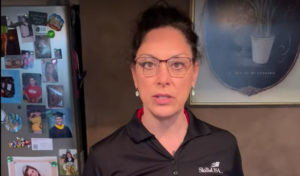
Danielle Hartman, top, the director of curriculum and instruction at Burlington County Institute of Technology, held Zoom meetings for various groups of vocational teachers.
Read this article as it originally appeared May 11, 2020 on ROI-NJ.com.
When the state ordered schools to close in March in an effort to slow the spread of the COVID-19 virus, teachers across New Jersey quickly made the transition to remote instruction.
But for teachers at New Jersey’s 21 county vocational-technical schools, the shift to online learning was more challenging, because training future plumbers, electricians, chefs, hair stylists, medical techs, police officers and other technicians is more “show” than “tell.”
Students at vocational-technical schools spend much of their time in shops and labs filled with elaborate equipment, from CNC routers and welding booths to industrial kitchens and simulated hospital rooms.
While Google Classroom, Zoom and other online learning platforms work well enough for lecture-based classes and chat room discussion, these tools were not designed to teach a carpentry student how to frame a structure with two-by-fours or an automotive technology student to replace worn brakes.
“Many of our career teachers were really struggling,” said Danielle Hartman, the director of curriculum and instruction at Burlington County Institute of Technology. “Teaching a hands-on curriculum is difficult when students are not in the classroom.”
But vocational teachers across the state stepped up and met the challenge.
At Union County Magnet High School for Science, Mathematics and Technology, teacher Janhavi Gupta had her biomedical engineering students research medical equipment that can help patients suffering from COVID-19.
In one project, she had them study ventilators, including how to design one. She also had them look into newer, less-expensive models and analyze their efficiency and workability. Gupta also invited a guest speaker from industry into her online session to discuss regulatory requirements of making medical equipment and the design and production controls.
“I thought it would be of interest for the students to discuss what it takes for a company like 3M to make N95 respirators, and why I can’t just make something in my garage and sell it as if it were the same,” Gupta said.
Justin Montgomery, the lead computer science teacher at Hunterdon County Vocational School District’s Computer Science and Applied Engineering Academy, also used the COVID-19 pandemic as a learning opportunity.
As part of a unit on data tools, he had his students manipulate and visualize COVID-19 data, including the number of new cases of the virus worldwide. The students also built apps using object-oriented design in JavaScript, built databases and queried data using Structured Query Language, or SQL.
“In order to motivate learning and provide positive examples of good data visualizations, students studied current visualizations surrounding COVID-19 data,” Montgomery said. “I wanted them to be able to select the appropriate type of data visualization to discover trends and patterns within a dataset.”
Not every class at county vocational schools was focused on the pandemic, though. At Gloucester County Institute of Technology, when the senior baking and pastry arts class was assigned pie-making, teacher Deneen Clark created a video of herself making pie dough at home. Students were required to make their own pie dough, a crumb topping and prepare a filling for the next stage of the assignment — documenting their progress with step-by-step photos.

Gloucester County Institute of Technology’s teacher Deneen Clark created a video of herself making pie dough at home for the senior baking and pastry arts class.
Similarly, Chef Jim Morton, a teacher in the Camden County Technical School District, created a video instructing students how to cut apart a whole chicken into eight parts, along with the preparation of each of the parts, including making a stock, broiling, grilling and baking.
Hartman, who is also an adjunct professor at Brookdale Community College where she teaches a course to prepare new career and technical education teachers for state certification, organized an online meeting attended by nearly 60 culinary arts teachers who shared challenges and success stories.
Realizing how valuable it was for teachers to share their experiences, Hartman organized another online meeting for automotive technology teachers, which also attracted nearly 60 participants. Sessions with teachers in allied health, business, cosmetology, and law and public safety followed.
During one of the sessions, Joseph Latigona, who teaches criminal justice at Burlington County Institute of Technology, acknowledged that hands-on learning is tough while students are at home.
Before schools were closed, Latigona said he used computer mapping software known as GIS, or Geographic Information System, to map out crime in a community. Now, he is teaching his students how to analyze the maps.
“We’re able to use websites on problem-oriented policing and were able to come up with hypotheses for robberies about why these crime hotspots exist,” said Latigona, who was a police officer for 25 years before becoming a teacher at BCIT in 2011.
Latigona is also having his students complete an organizational chart for a 100-person police force.
“Since we’re in the beginning phases of policing, we’re learning about the different types of units within a police department,” he said. “So we looked at community policing, we looked at all different kinds of units and then we started talking about chain of command.”
During the session for cosmetology teachers, Catherine Quinn, a teacher at Monmouth County Vocational School District, said she was having difficulty engaging her students on the Google Classroom platform.
So, instead, she met them where they spend most of their time: Instagram. She had them create Instagram accounts where they could submit photos of their classroom assignments.
“It’s just an easier way I’m finding right now to communicate with them,” Quinn told the group. “Though I still assign on Google Classroom, it gives them an advantage because they’re all on Instagram anyway.”
Somerset County Vocational & Technical High School’s instructors are also finding new and interactive ways to bring their lessons home.
Cosmetology instructors Julie Francis and Jessica Cicero have incorporated lessons where students are posting services they are performing on themselves and their family members.
The instructors also created a video on how common household items, such as paper clips, shampoo, paper towels and plastic bottles, could be used to practice on a mannequin.
“We are just trying to help the students keep some dexterity with their hands and give them alternatives to help move them forward,” Francis said. “When life gives you lemons, make lemonade.”



